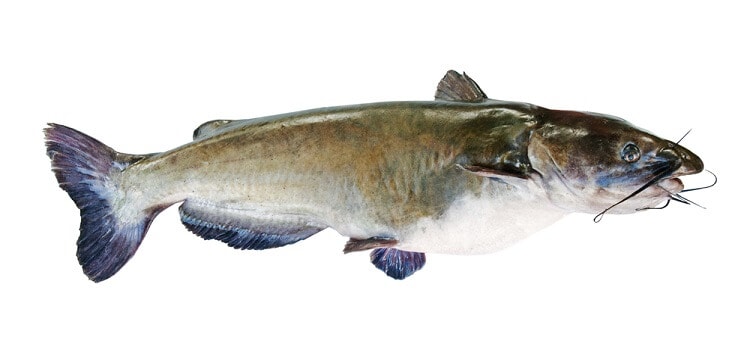After reeling your catch in, and noticing a slimy, scaleless catfish, a simple question can cross your mind – Is catfish safe to eat? Even though catfish are different from many freshwater fish species, the answer is yes- catfish are safe to eat. They are a very popular species and you can find many recipes for a tasty dinner.
The taste can vary depending on the catfish type, size, and water quality they inhabit. We recommend you try a few different recipes and see if it’s something you like. Fried catfish are a true delicacy in the southern U.S. states, which is something you should try.
Do people eat Catfish?
People all over the globe have been eating catfish for centuries. With their unique taste and potentially large size, a single fish could have fed a whole family or a village. There are many ways to prepare it such as grilling, frying, baking or even using it for a stew.
The majority of catfish served today comes from farms, rather than lakes and rivers. They are a good source of protein, and safer to eat since they are in a safer environment. All caught fish species can accumulate mercury and other toxic substances. Be sure to enquire a designated agency about your local fishing waters.
What type of catfish can you eat?

There are three main types of catfish in North America, flathead, blue, and channel catfish. All of them are safe to eat and are widely consumed. Their taste does differ, and there’s no way to tell which one has the best taste unless you try it yourself. Channel catfish are considered to be the best of the try, by many fishermen.
The taste of any catfish type is heavily influenced by its environment and food. Clear and waste-free water and a live food diet can positively affect the taste. Many prefer farm catfish rather than fresh ones since they are fed with quality food that doesn’t spoil the taste.
Is catfish healthy?
Catfish are one of the most common fish species that regularly take in the human diet. They are rich in healthy nutrients, such as proteins, healthy fats, vitamins, and minerals. Omega-3 acids and Vitamin B12 are important for maintaining a healthy heart, arteries, and brain tissue, and catfish contain plenty of them. Here are some of the nutritional facts about catfish.
A 3.5oz (100gram) catfish usually contains:
- Calories: 105
- Fat: 2.9 grams
- Protein: 18-22grams
- Sodium: 50 mg
- Vitamin B12: 121% of the average Daily Value
- Omega-3 fatty acids: 237 mg
- Omega-6 fatty acids: 337 mg
- Selenium: 26% of the average daily value
- Phosphorus: 24% of the average daily value
- Thiamine: 15% of the average daily value
By looking at nutritive values above, there is no doubt catfish are a great and healthy food source. But to provide an honest answer if it’s healthy or not, we need to discuss a couple of things.
Cooking method for catfish
A cooking method can “rob” your dinner of its healthy components or produce some harmful compounds. Deep frying or grilling is known to increase fat contents and decrease healthy Omega-3 fats. To keep valuable nutrients prioritize baking and steaming.

Contaminants
Fresh catfish can accumulate mercury and other dangerous substances. To prevent this from happening make sure you fish from safe sources or purchase farmed catfish.
Provided you cook it the right way, and it’s not contaminated, catfish is healthy to eat. Replacing a couple of meat meals with freshly baked catfish is good for your heart, brain, and body weight.
What does it taste like?

As we’ve mentioned before, farmed and fresh catfish usually don’t taste the same. Wild catfish tend to have a bland taste with some sweetness at the end. Farmed catfish are fed with granulated food, that makes them taste mildly sweet while retaining dense and moist flesh.
Smaller catfish tend to have firmer flesh and a more appealing taste.
If you are a fan of other whitefish such as tilapia, chances are you are going to like catfish. They do taste less flakey, however. Channel catfish are most widely recognized as the best tasting type, but some prefer flatheads.
Can you eat Saltwater catfish?
Freshwater catfish are a popular and tasty food choice across the globe, but what about their saltwater relatives? Saltwater catfish, like the freshwater ones, are perfectly edible. Although, they are poisonous. This might confuse you but stick with us. Saltwater catfish have sharp spines on the back, that secrete poison. By removing them, you won’t have anything to worry about, their flesh is safe to eat.
The other question is, should you eat saltwater catfish? They have a bad reputation by saltwater fishermen, who regard them as “garbage”. The reason doesn’t really lay in their taste, rather the fact they often take the bait intended for something else.
They taste similar to freshwater catfish, just saltier and more “fishy”. If you decide to catch them, make sure you are hitting clean waters.
A Quick Answer : Can Catfish Sting You
Can you eat raw catfish?
Many fish species are not fitted to be consumed raw and unprepared. Fresh catfish especially pose danger, since they can carry various parasites and bacteria. They are often infested by fecal waters that are drained into major rivers.
To prevent transferring any of the potentially harmful entities, make sure your catfish goes through a thorough cooking process. The internal temperature should reach at least 145 degrees Fahrenheit, to eliminate all parasites.
Can you eat catfish skin?
After the tiring process of cutting and cleaning the catfish, you might have wondered “ what if leave the skin, could I eat it?” If so, you are one of many.
The answer is yes, you can eat catfish skin. But here’s something you should keep in mind.
Wild catfish can absorb toxins and chemicals from the water. Studies have proven that these dangerous substances accumulate in the skin at a higher percentage than the fleshy parts of the catfish. That being said, it’s safer to avoid consuming catfish skin from untested waters.
Commercial catfish raised on a farm, are typically kept in clean and safe waters. If you enjoy eating catfish fillets together with the skin, the safe way to do it is by purchasing a farm-raised catfish.
Final Impression: Should I Avoid Eating Catfish?
After reading this article, we hope that nothing remained unclarified when it comes to consuming catfish. The obvious answer is that there’s no reason to avoid eating catfish unless you happen to dislike it. Catfish is an amazing source of important vitamins, minerals, healthy fats, and protein and can fit almost any type of diet. By purchasing farm-raised catfish and cooking it thoroughly you practically eliminate even the slightest reasons to be worried about. We encourage you to try various catfish recipes, and tell us about them!
If you have any other questions about catfish or catfishing, be sure to check out some of our many articles on the topic.
